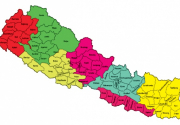
OR
#OPINION
Call for Debate on Constitutional Economics
June 15, 2024 08:45 AM

The constitution has mentioned that Nepal’s economy will be a socialism-oriented, market-driven economy, but it has not specified what type of socialism the country will adopt.
Nepal is a nation transitioning through various stages of governance systems, including the unitary Rana regime, feudal monarchy, multiparty democratic system, and federal democratic republic. The political and administrative governance system has always been a major philosophical thought at the center of debate. The Constitution of Nepal 2015 established a political and administrative system to be practiced. Key attributes of the constitution include the federal democratic republic system, mixed electoral system, secularism, and additional fundamental rights. These issues were broadly discussed and emphasized during the drafting of the constitution. However, the kind of economic system best for Nepal was not intensely debated in the Constituent Assembly, the current federal parliament, and provincial assemblies.
In fact, we have already delayed our debate on the national economic system. The constitution makers were off the track on the debate of the economic system, and as a result, the current economic crisis and business turmoil are being experienced in Nepal. The constitution is the result of a long and arduous peace process ensuring social justice and economic equality. It lays out an economic framework as a socialist-oriented market economy. However, it is important to ask whether the constitutional provision of a socialism-oriented economy is feasible under the current economic conditions. As economists commonly agree, social welfare can only be ensured after an industrial revolution, but the current scene is quite different. Given the vulnerability to global economic shocks and the spillover effects of globalization, a question arises: Is Nepal really able to afford social welfare overhead?
The constitution's preamble declares Nepal a "socialist-oriented federal democratic republic." This terminology hints at a mixed economic model, balancing elements of free markets with a focus on social welfare. There is a fundamental right that guarantees property rights clearly mentions that public, private, and cooperative sectors will be major pillars of the economy. These constitutional provisions aim to address major economic actors. The constitution has also mentioned social security, labor, employment, and social justice as fundamental rights. Therefore, we need to pinpoint these issues in our debate on a socialism-oriented economic system. The constitution has guaranteed social inclusion and justice for individuals and communities, but are these guarantees being implemented in practice? Are these issues covered by the manifestos of political parties, and are the three layers of government making the necessary laws and procedures to implement these fundamental provisions? These questions are fundamental to assessing how effectively the constitutional economy is being implemented. If you see the leading figures before the constitution promulgation and now, most of them are the same. There are not many changes in parties or the bureaucratic structure to implement the newly envisioned economic policy. In contrast, the expectations of citizens are not the same.
Currently, we have three layers of government working to deliver public services. People's expectations from the government are high, and the capacity to fulfill their demands is limited. The capital expenditure capacity is declining while recurrent financial expenditures are increasing. National savings and capital formation are going downward, and non-productive investment is rising. These macroeconomic indicators show fears and an unsafe business environment among investors. Amid the economic downturn and low economic growth projections by the IMF, Nepal conducted the Nepal Investment Summit 2024, where 148 projects were presented for investment. Nepal tries to convince foreign and domestic investors to inject their capital by amending some laws. Through the investment summit, Nepal has successfully delivered a good message to the global business community, showing that Nepal has a favorable investment climate. But is it sufficient to spread positive messages for investment to come to Nepal?
Delivering positive messages is important, but what are the practical and technical issues the business community is really facing? According to the Global Trade Facilitation and Paperless Survey, Nepal has a score of 58.06 percent, showing that procedural hurdles are still a big challenge for investors. When investors examine the legal framework and see the potential legal complexities in taxation, profit return, and operational procedures, they are not yet convinced of our current position.
The ideological and philosophical understanding of constitutional economics is not clear. The constitution has mentioned that Nepal’s economy will be a socialism-oriented, market-driven economy, but it has not specified what type of socialism the country will adopt. There are various types of socialism, but which type is envisioned for Nepal remains unclear. The practices we have made are mostly ad hoc, and a number of legal and institutional frameworks that are needed are not yet formulated. The provincial governments are not fully implementing provincial policies due to frequent changes in government. Those who unveiled the policy and plans cannot implement them, and the next team introduces their own policy and plans. While coming up with new ideas and policies is good, it is not good to introduce them without evaluating if the existing and past policies and plans were implemented well. Public taxes go to prepare these policies, but we do not get anything in return, and this process continues. This trend cannot support achieving the economic goals our constitution envisions.
In conclusion, Nepal's journey towards economic prosperity is ongoing. The 2015 Constitution serves as a compass, guiding the nation towards a future of shared prosperity. By embracing its unique economic model, fostering political stability, and investing in its people and infrastructure, Nepal can unlock its full potential and emerge as a vibrant and successful economy. However, it is equally important to identify what is wrong with constitutional economics and address these issues to strengthen the national economy and empower the global market. Therefore, the discussion on constitutional economics is unavoidable for Nepal. All stakeholders should pay great attention to leading this debate to revisit the difficulties of the national economy.
You May Like This

The Red Alert
Connecting the dots, one can see the direction the “socialism-oriented” state is heading towards. Socialism is not merely about the... Read More...

Just In
- RSP sets criteria for ambassador selection
- NEPSE inches up 3.21 points; daily turnover increases to Rs 5.07 billion
- Home ministry instructs CDOs to collect National ID card details at ward level
- Case filed at district court against 9 people on charge of rhino horn trade
- Import of EVs: Allegations of govt collusion with Cimex Inc
- Cooperative victims stage demonstration in Kathmandu (In Pictures)
- SC halts disciplinary action against Gandaki Province Assembly member Phanindra Devkota
- ICC T20 World Cup: South Africa reach semis with win over West Indies


















Leave A Comment